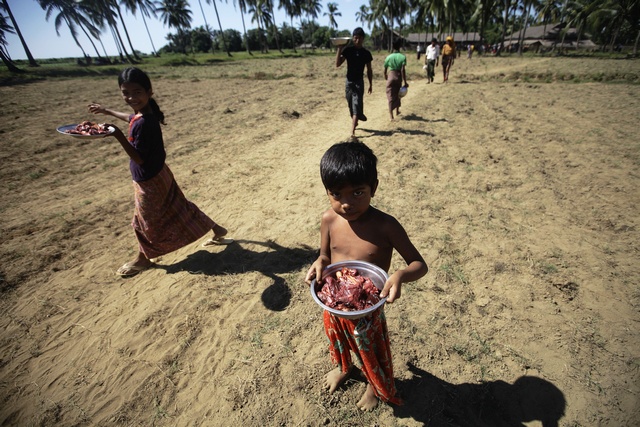The primary concern for UNICEF is the plight of children in Arakan State, and not the lexicon employed to describe members of the community, says Bertrand Bainvel, the agency’s leading official in Burma.
Speaking to DVB on Tuesday after a series of criticisms in the media, Bainvel sought to play down questions on whether UNICEF had opted to change its policy of terminology in referring to the “Rohingya” community as “Bengalis”, as preferred by the Burmese government and Arakanese Buddhist nationalists.
“The primary concern for UNICEF is really the situation of children in Rakhine [Arakan] State, wherever they live, because the data shows that there is a serious problem there,” said Bainvel.
“If communities, people and political leaders in Rakhine State are interested in the situation of their own children, this is definitely what they should focus on, and create a climate and an environment in which a development partner can [create] dialogue with them and can define with them the most appropriate support … and agree on the best strategy,” he said.
According to an Eleven Media report on 6 June, a UNICEF representative in Sittwe used the common term “Rohingya” when referring to a Muslim community in that region, sparking outrage from local administrators.
The report said that UNICEF’s Bainvel was later compelled to personally apologise for the verbal faux pas, and promise that his agency would not use the term again.
Bainvel told DVB on Tuesday that he had publicly apologised for an “oversight”, but would not be drawn into redefining UNICEF policy on the matter nor respond to how the agency would refer to the Muslim group in the future.
[related]
“I apologised for an oversight where a [particular] denomination was used, which led to a discussion which was not the focus of the forum – about whether it was appropriate or not to use the term ‘Rohingya’. But this is essentially not the [main] discussion,” he said.
Reiterating the long-term needs of children in the Arakan region, the UNICEF spokesman said, “What I’m saying is that it does not help denominating children by one name or another.”
He said one out of every two children in Arakan State was affected by the communal violence that has plagued the state for the past two years, a situation he said was “appalling”.
Asked whether UNICEF was adequately able to continue its humanitarian activities in the restive region, Bainvel said the situation was still “very tense”, but that they were “making every attempt at dialogue, to discuss, debate, and agree to disagree” for the sake of the children they are mandated to provide for.
“The most worrying sector is health,” he said. “With the rainy season, the environment becomes altogether more unstable. They [children] are more prone to water-borne diseases, and there is a sharp increase in cases of malnutrition.”
Pointing to the water and sanitation issues, he emphasised that UNICEF “can provide some immediate intervention, but the rainy season has already started, so we need to make sure we continue maintaining the facilities which have already been set up.”
After international aid workers were evacuated from Sittwe in March, Burma’s Ministry of Health claimed that it could make up the shortfall in humanitarian supplies. Bainvel said that although the Ministry had organised additional resources, beefed up its capacity, and sent more teams to visit camps for internally displaced persons, “over time, it has been difficult to sustain because of the environment of pressures and threats”. He elaborated by saying that many people in Arakan State blamed aid groups for helping one community over another.
“This is not an environment that is conducive for people to work in,” he said.
His comments were echoed by Pierre Peron, the information officer in Burma for the UN Office for the Coordination of Humanitarian Affairs, or UNOCHA.
“Of the staff from other international NGOs and UN agencies that were relocated following the attacks on UN and NGO offices [in March], about 50 percent have returned to Sittwe,” said Peron. “We’re currently working with all stakeholders to assist the return to full capacity of operations.
“For the moment, the challenge is at a logistical level. We have offices outside of the seventh quarter of Sittwe that are no longer available. A lot of the landlords who used to lease properties both for accommodation and office space in Sittwe have been threatened and are no longer renting.
“Simply put, there is not enough space for humanitarian workers to live or to work in,” he said.
Meanwhile, UNICEF announced on 4 June that it was unveiling a US$12-million project spread over two years to help the impoverished children of Arakan State, especially those affected by malnutrition.
“Children in Rakhine State are poorer and less likely to access basic services compared to children in other parts of Myanmar,” said Bainvel. “We need to prioritize the long-term development needs of Rakhine, so that every child gets the best possible start in life, regardless of ethnic, religious, or legal status.”
The UNICEF head representative told DVB on Tuesday that similar plans were in progress in Chin and Mon states, as the agency was prioritising the poorest regions of the country.



